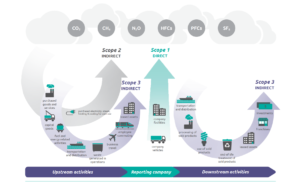Carbon Accounting: Not a question of IF but WHEN
Why Carbon Accounting is Imperative for Every Business
It is now widely understood that greenhouse gases, including carbon (CO2), play a significant role in regulating earth’s temperature. The more carbon (and other greenhouse gases) put into the atmosphere, the more the temperature rises. The full and farthest ranging effects of increases in earth’s temperature are not fully known. Carbon accounting is the first step businesses can take to understand their impact on the planet.
Issues such as rising sea levels, extreme and more variable weather, and changes in the availability of freshwater are some that have been identified. The safe upper limit of carbon in the atmosphere have already been surpassed. The time is now to reduce greenhouse gas levels.
Climate change and carbon emissions has slowly but steadily made its way into our cultural consciousness, and it is an important topic for the future of business. Businesses contribute to carbon emissions problem just by functioning, whether it’s through supply chain processes, office space, waste, the appliances utilized etc.

Carbon Accounting
Carbon Accounting refers to the process that businesses go through to measure the amounts of carbon dioxide they emit. Regardless of its size, every single business will be affected by this.
A company’s ability to track their own emissions will become extremely important for many reasons (beyond the purely environmental considerations), including:
- 1. Complying with a changing policy space
The overall trend in regulations around emissions and corporate environmental responsibility shows that they will only get more demanding. We are increasingly seeing global, national, and local policy reflect the desire to limit emissions, which will inevitably require businesses to keep account of their own emissions. For example, the EU and the US have proposed carbon border taxes that seek to levy taxes on carbon emissions from imported goods. The Securities and Exchange Commission is reevaluating its climate change disclosures right now, and we have been warned to expect stricter rules soon.
- 2. Economic considerations
The ability to track emissions through carbon accounting can help a company run more efficiently. When companies identify business activities that use a lot of energy it gains a more nuanced understanding of the business and its footprint. This understanding can help mitigate and ultimately reduce energy and resource use. Furthermore, many global business leaders believe that the private sector is on track to attach a tangible value to CO2 reduction.
Prominent investment management firm Blackrock CEO Larry Fink has talked extensively about the “tectonic shift” taking place, describing the increased focus of investors on sustainability focused companies. The ability of businesses to provide transparent carbon emissions accounting will ultimately impact stock prices. And according to Lincoln Payton, CEO of ClearTrace, a carbon accounting software company, “if Fink’s statement is any indicator, stock values will rise for companies that reduce their carbon emissions significantly and prove it with traceable, quantifiable carbon accounting data; values will drop for companies that aren’t following suit or transparently reporting on their carbon metrics.”
Lastly, Ceres, a non-profit sustainability research firm, released a report on corporate governance and ESG’s confirmed that “companies that adopt sustainable practices deliver superior financial results and can face the future with more resilience.”
- 3. Social and Business Development
Luckily, a company’s level of enthusiasm for and commitment to sustainability is an increasingly critical factor in attracting talent and customers, as well as being a boardroom priority. “A recent global survey of more than 3,700 students from 29 top business schools found that the respondents were ‘increasingly sorting companies into top and bottom environmental performers with associated consequences for recruiting and compensation.’ The survey found that 78% of students were more inclined to apply for a job with a company with excellent environmental performance, 80% were more likely to accept a job with such a company, and 44% would accept a lower salary to work for a sustainability standout”.
This change in attitudes is also reflected in studies about customer preferences, with Neilson, a global marketing research firm, finding that regardless of product or service category, brands with legitimate sustainability claims do better. This attitude has made it all the way to the top, made clear from a Deloitte study which says, “sustainability, which encompasses environmental, social, and governance (ESG) concerns, is increasingly positioned at the top of board agendas. Although it might not be the first boardroom topic you think of, sustainability is now central to corporate competitiveness and a company’s continued ability to operate.”
Time to Take Action
Carbon accounting is an important element to business accounting, and will only become more ubiquitous in the ever evolving business environment. Do you have processes in place to take stock of your carbon emissions?


